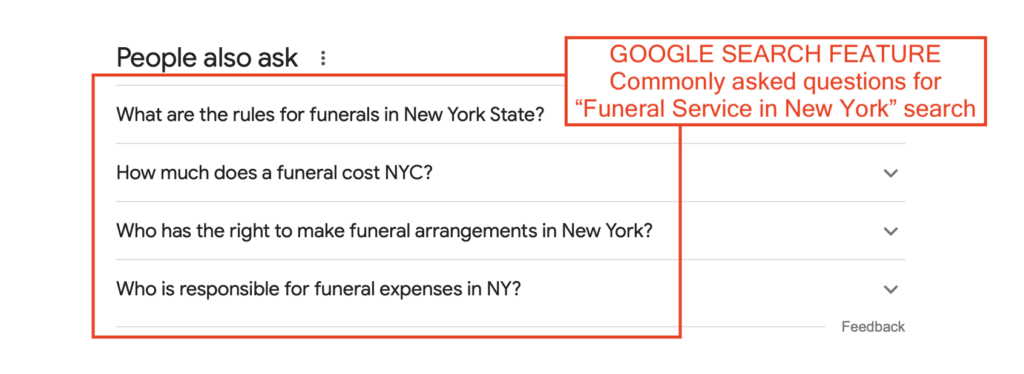Do you want to learn how your funeral services business can organically gain more new customers with SEO? In this article, we will discuss how SEO for Cremation and Funeral Services can help you outrank local competitors, achieve long-term results that will drive more clicks and organic traffic toward your funeral services website, and overall gain more new customers for your funeral services business.
What is Search Engine Optimization (SEO)?
SEO or Search Engine Optimization works by optimizing a website’s online content so it ranks higher on search engine result pages. Optimizing content relevance, along with link popularity and technical configuration, will make a website or web page easier to find, more popular, and more relevant to a user’s search query. This, in return, will help drive more organic traffic to your funeral service website, bringing you more new customers for your business.
Understanding SEO is key to helping your funeral service website rank higher organically:
On-page SEO, or on-site SEO, focuses on optimizing your web pages to rank higher using title tags, relevant keywords, internal links, meta descriptions, and URL slugs.
Off-page SEO focuses on elements outside your funeral service website, like building backlinks and making efforts to gain exposure using different channels and platforms.
Technical SEO focuses on the optimization of technical aspects of your funeral service website for search engines. These will usually involve fixing indexing issues, duplicate content, page speed, and ensuring your site is mobile-friendly.
Need Help With Your SEO? We Got You!
How does SEO work?
It’s important to understand how SEO for funeral services works so that your website can thrive in the online competitive landscape and ensure relevant and quality content.
- Crawling – This is when search engine bots or web crawlers find new and updated content on your funeral business website. This can be a webpage, a PDF, images, videos, and other file formats that are accessible and can be discovered through links by these search engine bots.
- Indexing – This is when a website or webpage URL is indexed. This is usually the step after the crawling stage, and it stores, analyzes, and organizes the content and connections between pages. You need to ensure that your URL is indexed so search engines can find it and rank it on SERP or Search Engine Results Pages.
- Ranking – This is the third step after crawling and indexing, and the ranking of your web pages is processed using intricate algorithms. Your ranking will depend on your content quality, relevance, and overall user experience.
Not sure how to get started with SEO for funeral services?
Why SEO for Funeral Services?
Many businesses take advantage of using SEO as part of their marketing campaign because it involves lower advertising costs. It can also improve your digital ROI or return on investment, and the chance to promote your funeral service business every day. Consider investing in SEO for funeral services if you want to rank higher on search result pages and increase brand visibility. SEO can also help build credibility because having a high rank on SERP signals to users that search engines trust your funeral business website.
Search Engine Optimization is a long-term strategy that will give you positive results in the long run, such as more organic leads and sales, high-quality traffic, and a competitive advantage over local competitors.
Let’s look at a Search Engine Results Page (SERP) for “Funeral Service New York”:

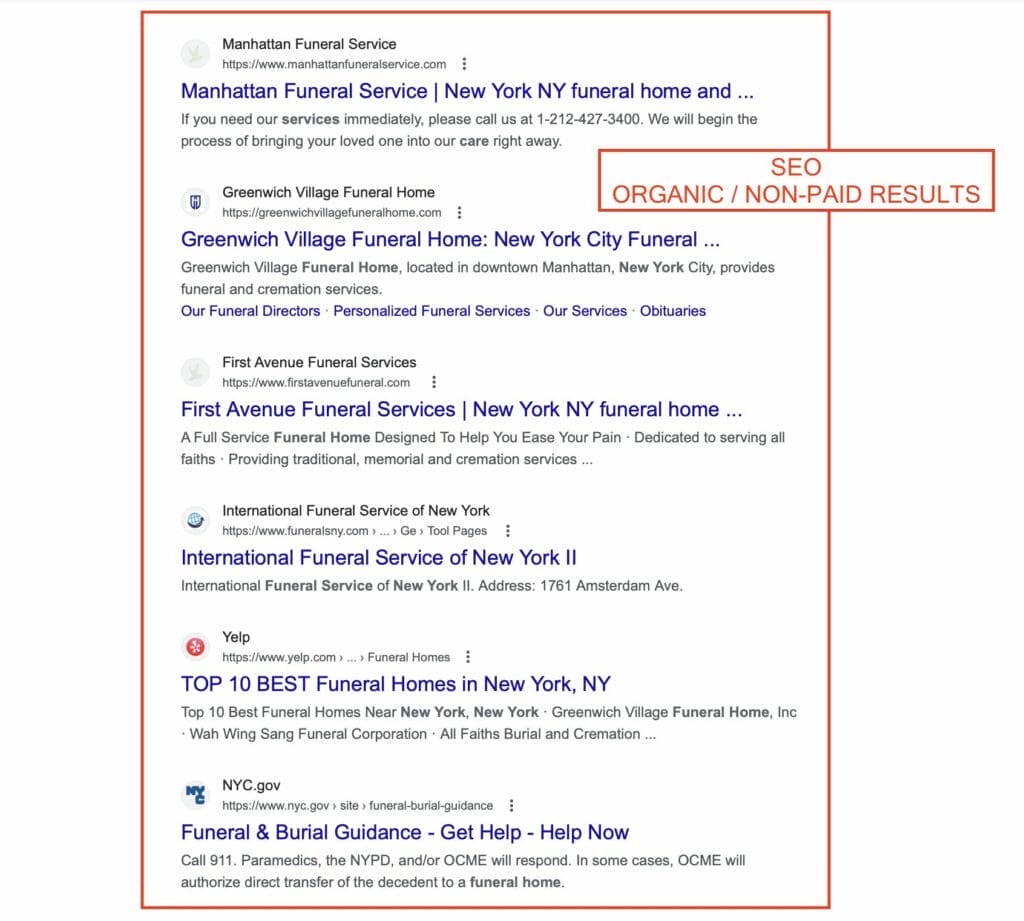
Need A Better SEO For Your Website?
SEO vs. Google Ads
Google Ads and SEO are two different ways to help people find your funeral service online, but they work in very different ways. With Google Ads, you pay money to show up at the very top of the search results right away. It’s kind of like renting a billboard on a busy street; you get seen quickly, but once you stop paying, your ad disappears. You can check out our Google Ads for Funeral Services for more information!
SEO, on the other hand, is like planting a garden. It takes time, effort, and care to grow, but once your website is well-optimized, it can keep bringing in visitors without paying for every single click.
For funeral services, Ads can be useful if you want to reach families immediately during urgent situations, while SEO is better for building long-term trust and helping people find you when they’re planning. Using both together can give your funeral home quick visibility now and steady growth in the future.
Local SEO
In addition to on-page SEO, off-page SEO, and technical SEO, another strategy you can implement to improve your funeral service website ranking is local SEO. This is also an ideal option if your funeral service business operates in one or more locations.
Local SEO for funeral services can help your funeral business appear at the top of local search results, or when it includes a specific location, for example, searches like “funeral service near me” or “funeral service in New York City”. Local SEO can also be used to help attract leads in your local area by encouraging feedback or online reviews from previous customers who used your funeral services.
Google Business Profile (Previously Called Google My Business)
Google Business Profile, which used to be called Google My Business, is one of the most important tools for funeral homes to show up online when local families are searching for help.
Think of it as your online business card that appears right in Google Search and Google Maps. It lets people quickly see your funeral home’s name, address, phone number, website, and even photos without needing to click around. Families can also read reviews from others, check their hours, and get directions instantly.
Keeping your profile up to date is especially important for funeral services because people often need clear, accurate information right away during emotional times. By adding compassionate descriptions, high-quality photos, and responding kindly to reviews, you not only improve your chances of showing up higher in local searches but also build trust with the families who need you most.
Competitive Offer
A competitive offer means showing families why your funeral home is the best choice compared to others in your area, but doing it in a caring and respectful way. Instead of focusing only on price, think about the unique value you provide.
For example, do you offer flexible payment options, personalized memorial services, or special support programs for grieving families? Highlighting these details on your website makes your funeral home stand out without sounding pushy. Families looking for funeral services often feel overwhelmed, so a clear explanation of what makes your services trustworthy and compassionate can give them comfort. By combining fair pricing with meaningful benefits like 24/7 availability, beautiful facilities, or experienced staff who guide families through every step, your competitive offer helps people feel confident that they are choosing the right place for their loved ones.
Having A Good SEO Can Help With Getting More Customers. We’re Here To Help You!
On-Page SEO Strategies
Just like we mentioned at the beginning of this article, on-page SEO works by optimizing your web pages to rank higher. Let’s look at on-page SEO strategies you can apply for your SEO for funeral services campaign.
Meta Descriptions
Meta descriptions are the short snippets of text that appear below the title tag in search results. While they don’t directly affect rankings, they strongly influence whether someone clicks on your website. For funeral services, this is a chance to show compassion while being informative.
A good meta description might read: “Compassionate funeral and cremation services in Los Angeles. Our experienced staff provides dignified care, support, and affordable packages for your loved one.” Keeping descriptions between 150–160 characters ensures they display properly in search results. Writing unique, empathetic descriptions for each page can increase click-through rates and show families that your funeral home understands their needs.

Title Tags
Title tags are the clickable headlines that appear in search engine results, and they are one of the strongest signals Google uses to determine what a page is about. For a funeral home, an optimized title tag should include your primary keyword along with your location, since most searches are local in nature.
For example, instead of a vague title like “Our Services”, a more effective title would be “Funeral Services and Cremation in [City] | [Funeral Home Name].” Title tags should be concise (50–60 characters), descriptive, and compelling enough to encourage families to click. Adding your brand name at the end also helps build recognition and trust.

URL Slugs
A URL slug is the part of a webpage’s address that comes after your domain name, and it plays a big role in both SEO and user experience. For funeral homes, clear and descriptive slugs help families and search engines quickly understand what the page is about.
Instead of a long, confusing URL like www.examplefuneral.com/services?id=123, a clean slug such as www.examplefuneral.com/cremation-services is much more professional and easier to remember. Using short, keyword-rich slugs like “funeral-planning,” “burial-services,” or “grief-support” improves visibility in search results and helps families feel confident that they’ve landed on the right page. Always keep slugs lowercase, simple, and without unnecessary numbers or symbols.

Need Help With Having A Good Title Tag?
Schedule A Free Strategy Session!
Alt Tags
Alt tags, also called alternative text, are short descriptions you add to pictures on your website so search engines and people using screen readers can understand what the image is showing. For funeral services, this is especially important because families often search for visuals like flower arrangements, memorial chapels, or urns, and alt tags help those images appear in Google search results.
For example, instead of naming a photo “image123.jpg,” you could write an alt tag like “elegant white funeral flower arrangement” or “lady crying in a funeral.” This not only improves your website’s accessibility for people with vision difficulties but also makes your site more likely to rank higher in searches. Using thoughtful, respectful descriptions in your alt tags ensures that your images support your SEO while still showing care and dignity for the sensitive nature of funeral services.

Improving Readability
Improving readability means making sure the words on your website are easy for anyone to understand, even during stressful times. When families visit a funeral home’s website, they may already feel overwhelmed, so long, complicated sentences or confusing terms can make things harder.
To improve readability, it helps to use simple words, shorter paragraphs, and clear headings so visitors can quickly find the information they need, such as service options, costs, or what steps to take after a loss. Adding bullet points, FAQs, and gentle, conversational language also makes the content easier to read. Search engines, like Google, also prefer websites that are easy to understand, so improving readability not only helps families but also boosts your SEO.
For funeral services especially, a website that feels clear, calm, and compassionate gives families comfort and makes them more likely to trust your funeral home.
Too occupied to create your SEO for funeral services campaign? We make it easier for our clients!
Internal Links
Internal linking means connecting one page of your funeral home website to another, and it is essential for guiding both visitors and search engines. For example, if someone is reading your blog post about “How to Plan a Funeral,” you can include a link to your dedicated “Funeral Planning Services” page.
This not only helps families easily find the next step they need but also signals to Google which pages are most important. Strong internal linking improves navigation, increases time spent on your website, and helps distribute authority across your key service pages, such as cremation, burial, and memorial planning.
External Links
External links point from your website to other trustworthy websites, and they build credibility in the eyes of search engines. For funeral homes, linking to reputable resources such as government grief support hotlines, local cemetery associations, or organizations like the National Funeral Directors Association shows that you are connected to reliable information sources.
External links are not about sending people away from your site; they are about showing you care enough to provide valuable, authoritative resources. When used sparingly and thoughtfully, external links can enhance your authority and improve SEO.
Compress Large Image Files
Funeral service websites often use images of facilities, memorial setups, or comforting visuals to create a warm and supportive online presence. However, large image files can slow down your website, which harms both SEO and user experience. By compressing images before uploading without sacrificing quality, you ensure that your pages load quickly on both desktop and mobile devices.
This is especially important since many families searching for funeral homes will be using their phones. Fast-loading images mean less frustration and a smoother browsing experience, which increases the likelihood that visitors will contact you.
Optimize Website
Website optimization is the process of making your site fast, user-friendly, and effective at converting visitors into clients. For funeral homes, this includes mobile responsiveness (since many searches are urgent and done on smartphones), clear navigation (so families can quickly find services, pricing, or contact details), and strong calls to action such as “Call Us 24/7 for Support.”
Optimizing also involves technical elements like improving page speed, ensuring your site is secure (HTTPS), and structuring content with proper headings for readability. An optimized website not only ranks better on Google but also provides a compassionate, stress-free experience for families during difficult times.
Having A Good On-Page SEO Is Really Important To Getting More Traffic. Let Us Help!
Keyword Research
Keyword research is essential to support your SEO efforts and to ensure that your SEO for funeral services marketing strategy is effective. You will need to research keywords relevant to your business to be able to understand the terms users use to search for your specific products and services.
Monthly Search Volume
Monthly search volume tells you how many times people search for certain words or phrases on Google each month. For funeral homes, this could include keywords like “funeral home near me,” “cremation services,” or “affordable funeral packages.”
For example, if “funeral home near me” has 5,000 searches per month, it means around 5,000 people are looking for that service on Google every month. This information helps you understand which services people are actively searching for. High search volume means more potential families are looking for that service. However, it also means more competition, since many other funeral homes may be trying to rank for those popular terms. Lower search volume keywords might not bring as many visitors, but they can still be powerful, especially if they are very specific, like “veteran funeral services in Los Angeles” or “eco-friendly cremation options.”
Keyword Difficulty
Keyword difficulty (KD) measures how hard it is to rank on the first page of Google for a keyword. Think of it like competition in your local area. If the keyword has a high KD score, it means a lot of strong websites (maybe national chains or well-established funeral homes) are already ranking for it, making it harder for smaller businesses to break through. If the keyword has a low KD score, it’s easier to rank, since fewer websites are competing for it.
For example, a keyword like “funeral home” may have very high difficulty because almost every funeral service provider tries to rank for it. On the other hand, something like “Funeral in Los Angeles” may have lower difficulty, since fewer funeral homes target such a specific search. Choosing lower-difficulty keywords helps you stand out and connect with families who are searching for exactly what you provide.
Not sure how to choose the right keywords for your SEO campaign?
Keyword Tools for Keyword Research
Google Autocomplete Predictions
This feature can be useful for keyword research since it works by using an automated system to generate real and trending predictions. These are usually based on relevant queries that consider the location and language of the search query.
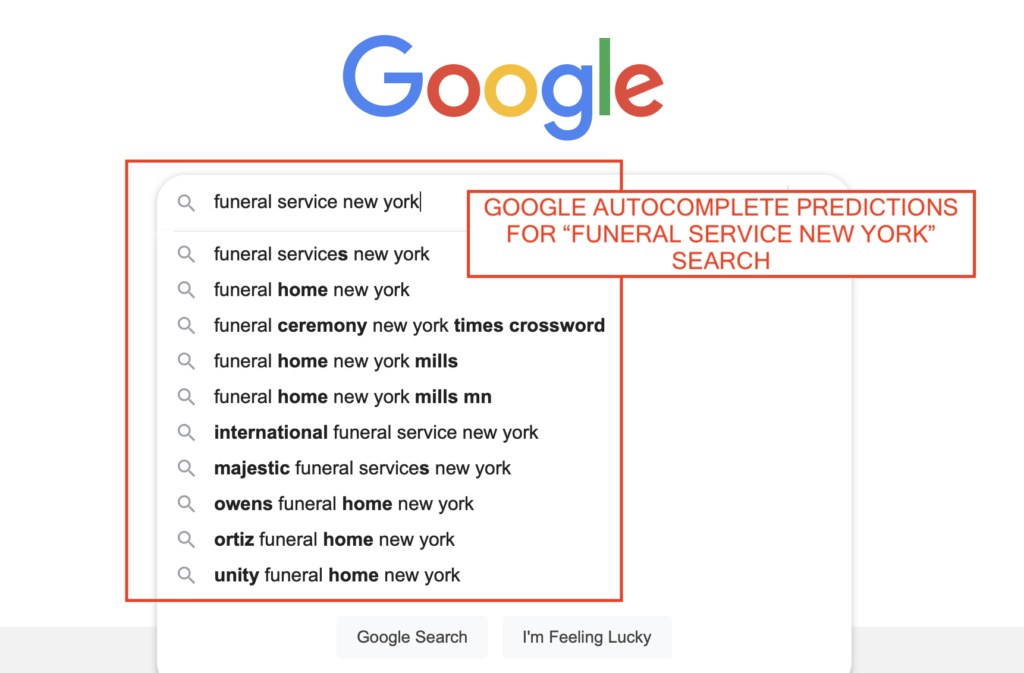
Google Related Searches
These can be found at the end of the results page, and it is a feature that can help you better understand the search intent of your target audience. It also generates SEO-related search keywords based on Google’s algorithm.

Google Keyword Planner
This is a free tool that you can access from the Google Ads Dashboard. It provides keywords relevant to your search query, and it can provide data insights on a keyword, such as its popularity and its competition level. A keyword planner can be very useful for keyword research since it can help you find the right high-intent keywords to use, and for potential leads, find your funeral service website.
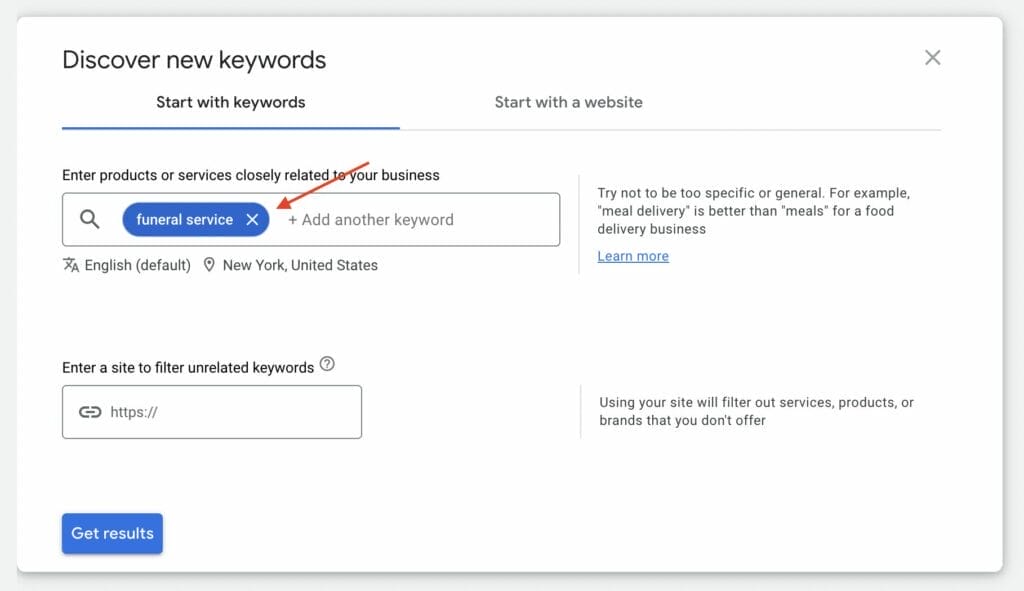
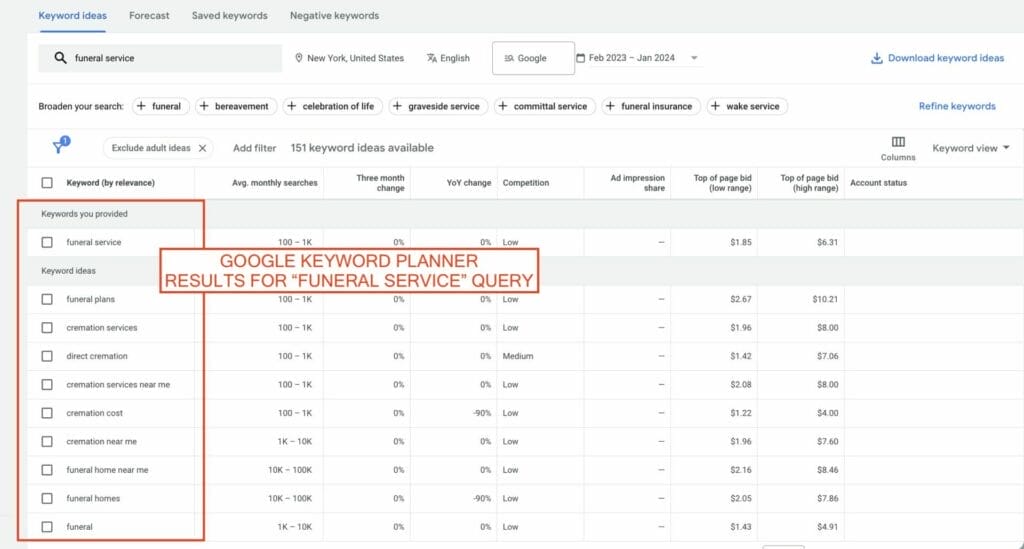
Browser Extensions
There are plenty of browser extensions that are free to use to help with your keyword research. Here are some examples we recommend:
Keywords Everywhere is a browser extension that doesn’t require you to sign up or log in to any SEO tools online. It offers a “freemium” plan that will give you enough data on keywords you search for, such as volume searches, CPC or cost per click, relevant keywords, and even long-tail keywords.
Here is an example and the results using the search “funeral services new york”:
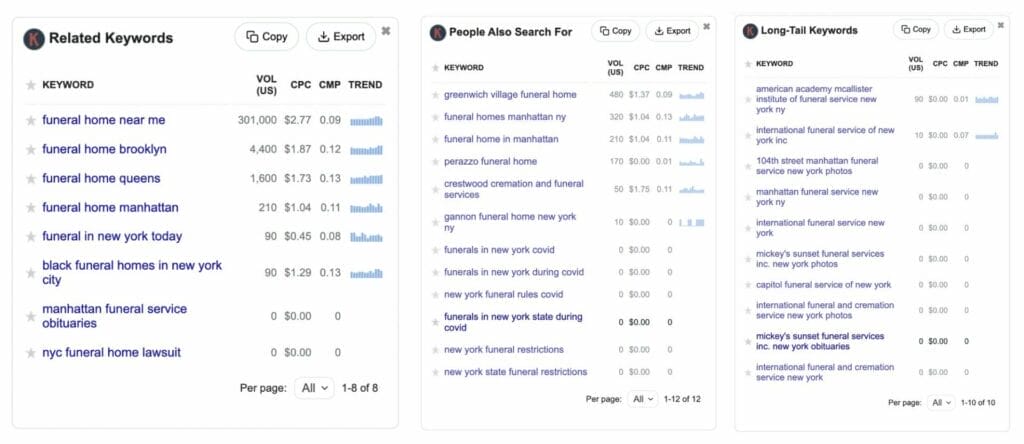
What’s My Serp
What’s My Serp is another browser extension we recommend using to help with your keyword research. This is also a free tool, but it requires you to create an account to access its keyword analytics, CPC, and collection of search terms. An advantage of this free tool is that it also offers a free SERP checker tool.
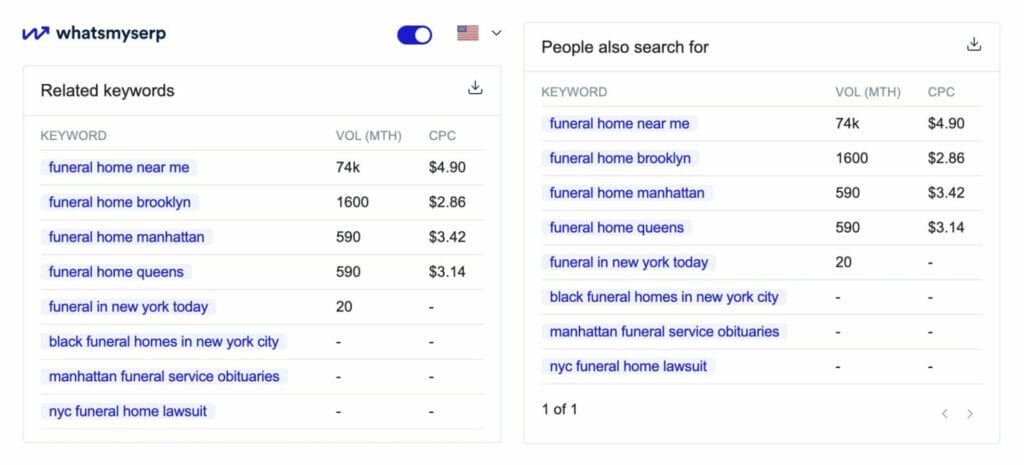
Ahrefs Free Keyword Generator
Ahrefs Free Keyword Generator is a helpful online tool that shows you what people are actually typing into Google when they search for things like funeral services, cremation, or memorial planning. By typing in a word or phrase, the tool gives you a list of related keywords along with how many people search for them each month and how difficult it might be to rank for them.
For a funeral home, this can be very useful because you can discover the exact phrases families use, such as “affordable funeral services near me” or “cremation cost in Los Angeles.” This saves you from guessing and helps you create website pages, blog posts, and FAQs that answer real questions people have. The best part is that the generator is free, easy to use, and doesn’t require advanced SEO skills, making it a great way for funeral homes to find new keyword ideas that bring in more visitors while staying compassionate and informative.

Here’s a sectioned explanation for why “cremation services near me” is a good keyword:
High Search Intent
When someone searches “cremation services near me,” they are in immediate need of funeral or cremation arrangements. This keyword reflects transactional intent, meaning the searcher is actively looking for a provider and is close to making a decision.
Local Focus
The phrase includes “near me,” signaling that the person is specifically seeking a cremation provider in their area. This makes it a highly relevant local keyword, ensuring your services appear right when and where they are needed.
Consistent Demand
Cremation is a common and growing choice for families making end-of-life arrangements. Targeting this keyword ensures a steady flow of potential clients searching for help during sensitive times.
High-Value Leads
Because this keyword attracts people who are ready to purchase services, ranking for it can result in qualified leads. Families searching this phrase are not browsing; they are ready to contact and book a provider.
Here’s a sectioned breakdown for why “Erickson Funeral Home and cremation services, Darlington obituaries” is not a good keyword:
Too Narrow and Branded
This keyword is tied to a specific funeral home and location. People searching it already know the business they want, which means it won’t attract new families or expand reach—it only serves those already familiar with the brand.
Low Search Volume
Obituary searches are typically limited to people connected to a deceased individual. As a result, the search demand is extremely low and temporary, offering no long-term SEO value.
No Business Growth Potential
While obituary pages are important for families, targeting this keyword in an SEO strategy won’t generate new client leads. It doesn’t connect with people searching for funeral or cremation services—it only provides information about a specific death.
Better Alternatives Exist
Funeral homes benefit more from ranking for service-based, local intent keywords like “funeral services near me,” “cremation services Darlington, WI,” or “affordable funerals near me.” These attract people actively seeking arrangements and can generate consistent new business.
Tracking Keyword Rankings with Serprobot
Serprobot is an online tool that helps you see exactly where your website shows up on Google for specific keywords. For funeral homes, this is important because families often search online when they need services. Instead of manually typing “funeral home near me” into Google every day and trying to find your website in the results, Serprobot does the work for you. It checks your rankings automatically and tells you the exact position your site holds.
Tracking your keywords is useful because it shows whether your website is reaching families who are actively searching. For example, if you find that your funeral home ranks well for “cremation services Los Angeles,” you know people looking for that service can easily find you. On the other hand, if you rank low for “affordable funeral packages,” that tells you where you need to focus your SEO efforts. By watching these rankings over time, you can also see if the changes you make to your website are actually helping.
The process is simple. First, you create a Serprobot account. Then you add your funeral home’s website and enter the keywords you want to track. Common examples include “funeral home near me,” “cremation cost Los Angeles,” “eco-friendly funerals Los Angeles,” or “funeral packages Los Angeles.” After you enter these, Serprobot scans Google and reports back with your ranking. For example, it may show your site in position #3 on page one or #18 on page two.
This information is powerful because it helps you make smarter marketing decisions. If you discover you are already ranking #2 for “cremation services in Los Angeles,” you can focus on maintaining that strong position. If you are ranking #35 for “funeral home near me,” you know you’ll need to put more effort into local SEO, such as improving your Google Business Profile or adding more location-based content. By consistently tracking your rankings, you’ll clearly see what’s working and what still needs improvement.

Need Help With Choosing The Right Keywords?
Using Relevant Keywords For Funeral Services
Using relevant keywords means choosing the exact words and phrases that families are likely to type into Google when they are looking for funeral services, and then naturally including them in your website content.
For example, instead of just writing “we provide services,” you could use a more specific keyword like “affordable funeral services in Los Angeles” or “compassionate cremation options.” This makes it easier for search engines to connect your website with the people who need it most.
The key is to use these keywords in a natural way, within your page titles, headings, meta descriptions, and paragraphs, without forcing them or repeating them too many times. For a funeral home, using relevant keywords is not just about ranking higher on Google; it’s about making sure families can quickly find clear, helpful information during an important time in their lives. By matching your words with their search terms, you build trust and make your website a welcoming one.
Choosing The Right Target Keywords
Choosing the right target keywords means carefully selecting the words and phrases that will bring the most meaningful visitors to your funeral home’s website. Not every keyword is worth chasing; some may get lots of searches but don’t match what families are really looking for, while others may be too competitive to rank for.
For funeral services, it’s important to balance short, broad terms like “funeral home” or “cremation services” with longer, more specific phrases such as “affordable funeral home in Los Angeles” or “prepaid funeral plan options.”
The right keywords should reflect both urgent needs, like finding a service immediately, and long-term needs, like planning. When you focus on keywords that match the real intent behind a family’s search, your website is more likely to attract people who not only visit but also choose your services. This way, you’re not just bringing in traffic, you’re connecting with families at the exact moment they need guidance and support.
Long-Tail Keywords
Long-tail keywords are longer, more specific phrases that people type into Google when they know exactly what they are looking for. Unlike short, broad terms like “funeral home” or “cremation,” long-tail keywords usually have three or more words, such as “affordable cremation service in Los Angeles” or “funeral home with chapel near Los Angeles.”
These keywords may get fewer searches each month, but they are very valuable because they attract people who are closer to making a decision and need a specific service. For funeral homes, long-tail keywords are especially powerful because they allow you to reach families with different needs from urgent situations, like “funeral services open today,” to pre-planning searches, like “how much does a prepaid funeral cost.”
By adding these kinds of phrases naturally into your website pages, blog posts, and FAQs, you not only improve your chances of ranking higher on Google but also connect with families in a more personal and helpful way.
Short-Tail Keywords
Short-tail keywords are short and broad search terms, usually made up of one or two words, such as “funeral”, “funeral home”, or “cremation”. These keywords often have a very high search volume because many people type them into Google, but they are also very competitive since almost every funeral service provider is trying to rank for them.
While short-tail keywords can bring more traffic, they don’t always tell you exactly what the person is looking for. For example, someone searching “funeral” might want to know about funeral costs, traditions, or services in their area. Even though they are less specific, short-tail keywords are still important for funeral homes because they build visibility and let Google know what your website is about.
The best approach is to use short-tail keywords along with more detailed long-tail keywords, so you can capture both general searches and specific ones, reaching families whether they are just starting their search or ready to make a decision.
Off-Page SEO Strategies
As mentioned at the beginning of this article, off-page SEO will support your SEO for funeral services efforts from the outside through factors like backlinks and gaining exposure for your website using different channels and platforms.
Let’s look at off-page SEO strategies you can implement for your funeral service website.
Guest Posting
Guest posting means writing an article for another website, usually one that already has an audience you want to reach.
For example, a funeral director could write a helpful article about “planning a memorial service” for a local community blog or senior living website. At the end of the article, you include a link back to your funeral home’s site. This not only brings in potential readers but also strengthens your SEO through backlinks.
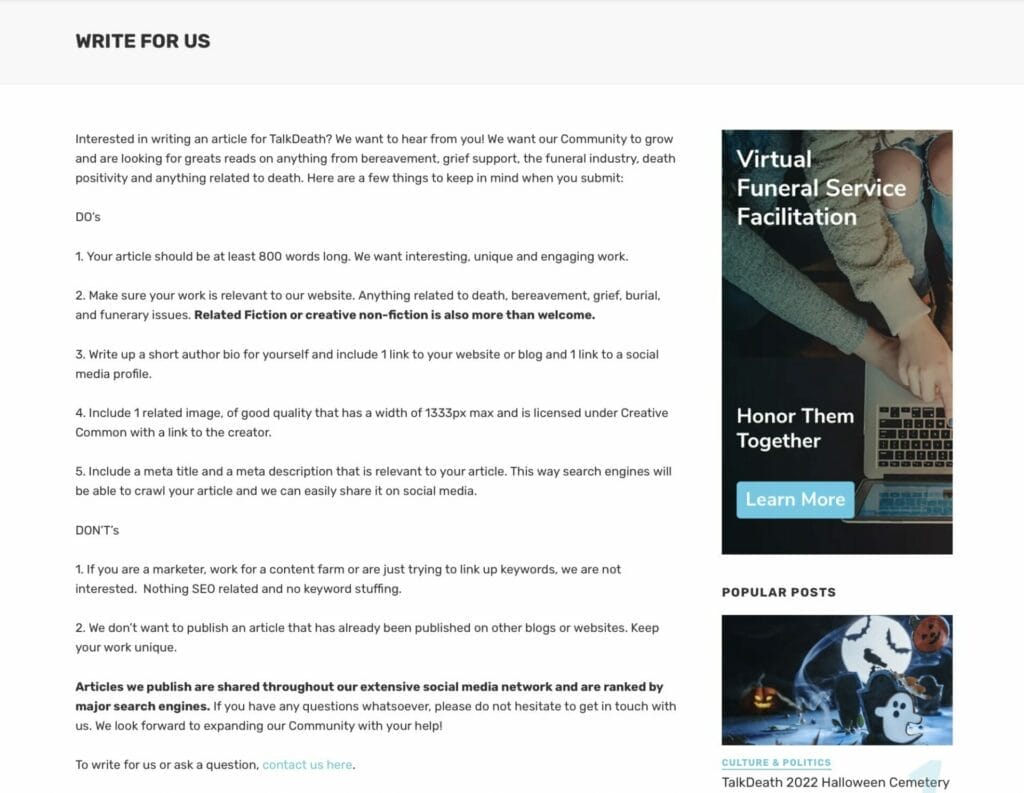
Content Marketing
Content marketing is creating helpful, useful information that people want to read and share. For funeral homes, this might include writing blog posts about grief support, funeral traditions, or tips for pre-planning services.
When people find this content helpful, they may share it or link to it, which increases your authority in Google’s eyes. It also shows families that you care about educating and supporting them.
Unsure which content marketing channels will be most beneficial for your funeral services business?
Social Media Marketing
Social media doesn’t directly affect your Google ranking, but it helps people discover and share your website. When you post helpful articles, service updates, or memorial tributes on platforms like Facebook, more people visit your website. Over time, this increased visibility can lead to more backlinks, mentions, and trust in your funeral home’s brand.
Fix Broken Links
Broken links lead to dead ends, such as “404 Not Found” error pages. They happen when you delete or move a page without updating the link. For funeral homes, this might occur if you remove an old obituary, change a service URL, or update your blog.
Too many broken links frustrate visitors and tell search engines that your site isn’t well-maintained. Fixing them is simple: use a tool like Screaming Frog, Ahrefs, or even Google Search Console to find broken links, then either redirect them to the correct page or remove them entirely. A clean, error-free site creates a better experience for families and helps preserve your SEO strength.

Online Forums
Online Forums can help with your off-page SEO optimization efforts by building authority, gaining more backlinks, and driving website traffic, which will, in turn, bring you more potential new customers. Additionally, participating in online forums will not only help your funeral services website be more popular online, but it will also improve your ranking on SERP.
When joining online forums, you want to establish your expertise in the funeral services industry, and you will need to link relevant sources (such as your funeral services pages) to support your answers.
Some of the online forums you could join are Reddit, Quora, LinkedIn, and Facebook. You will need to provide accurate answers and follow the platform’s policies. Avoid adding links in every single answer you provide, and don’t spam the comment section only to get more links. This is because spamming will diminish your credibility and can potentially ruin your reputation.
Backlinks
Backlinks are links from other websites that point back to your own, and they act like a vote of confidence in the eyes of Google. When trusted websites link to your funeral home’s site, it tells search engines that your business is reliable and worth showing higher in search results.
For funeral services, backlinks can come from places like local news sites, church websites, hospice care organizations, or community groups that you partner with. For example, if your funeral home sponsors a local charity event and the event’s website links back to you, that backlink helps both your reputation and your SEO.
The key is to focus on quality, not just quantity. A few backlinks from trusted, local, and relevant sources are far more valuable than dozens from random websites. By building relationships in your community and sharing helpful resources online, you can earn backlinks naturally while showing families that your funeral home is active, caring, and connected.
Local Listings
Local listings are online directories where your funeral home’s name, address, phone number, and other details are published so families in your area can easily find you.
Think of them as modern-day phone books, but digital and searchable. For funeral services, being listed in the right places is very important because families often search for help close to home, and local listings help your business show up in those searches.
Examples of local listings include Google Business Profile, Yelp, Yellow Pages, Bing Places, and local community directories. The most important thing is to make sure your information, especially your name, address, and phone number, is consistent everywhere, because even small mistakes can confuse search engines and make your website rank lower.
Adding photos, service descriptions, and hours of operation to these listings can also make your funeral home stand out and feel more trustworthy. By keeping your local listings accurate and up to date, you make it easier for families to find you during their time of need.
Need Help With Off-Page SEO?
What is AI SEO?
AI SEO is the practice of optimizing your content so that it gets picked up, summarized, and recommended by artificial intelligence tools like ChatGPT, Google Gemini, and Perplexity. Traditionally, SEO focused on ranking higher in Google search results, but now more people are asking AI chatbots and assistants for answers. This means businesses, including funeral homes and other service providers, need to make sure their content is written in a way that AI tools can easily understand, trust, and highlight. Some people call this LLM SEO (because it’s about large language models), GEO or GSEO (generative engine optimization), or simply ChatGPT SEO.
Similarities Across AI Platforms
No matter which AI tool you look at, they all rely on massive amounts of content pulled from the internet. They tend to favor sources that are trustworthy, clear, and up-to-date. They also look for information that is original and useful rather than repetitive. Just like Google, these AI models want to give users the most helpful and accurate answers. This means that if your content sounds exactly like everything else already published online, it won’t stand out. But if you provide unique insights, fresh data, or real-life experiences, your content is more likely to be used in AI answers.
Why Unique Information Matters
AI models are trained on content that already exists, so when they summarize, they often recycle what is common across many sources. If your website, blog, or article simply repeats the same facts that are everywhere else, the AI has no reason to choose your content.
But if you add something new, like personal expertise, case studies, unique statistics, or even community stories, AI models recognize it as valuable. This makes your content more likely to show up in responses. Other forms of media, such as YouTube videos and press release (PR) articles, also help because AI systems pull from transcripts, summaries, and mentions across the web. The more unique and widely distributed your information is, the more chances AI has to find and cite it.
Key Differences Between ChatGPT, Gemini, and Perplexity
While the overall idea of AI SEO is the same, different AI platforms prioritize slightly different things.
-
ChatGPT often focuses on clarity and reliability. It tends to summarize content that is written in a straightforward, structured way. If your content answers questions directly and is easy to understand, ChatGPT is more likely to use it.
-
Google Gemini is closely tied to Google’s ecosystem, so it leans toward freshness and authority. It may pull more heavily from websites that are regularly updated, connected to Google’s indexing system, or backed by well-known organizations.
-
Perplexity acts more like a research assistant, often citing sources directly. It prioritizes detailed, credible sources with citations. This means if your content is well-documented, includes references, or is published in places considered reputable, Perplexity is more likely to highlight it. It’s important to remember that these priorities change frequently as the platforms are updated. What works today might shift in a few months, which means businesses need to stay flexible and keep testing new strategies.
Technical SEO Strategies
The third SEO strategy you must implement is technical SEO, since this will ensure that all technical aspects of your SEO for funeral services will run smoothly on search engines. First and foremost, you will need to secure your funeral services website.
Website Security
Website security is one of the first signals Google uses to decide if your site is trustworthy. If your website still uses HTTP instead of HTTPS, visitors may see a “Not Secure” warning in their browser, which can scare families away. HTTPS means that the connection between the visitor’s browser and your site is encrypted, protecting sensitive information like contact forms or pre-planning details.
For funeral homes, where people often share private family details, security is not just a ranking factor; it’s a trust factor. Moving your site to HTTPS requires installing an SSL certificate from your hosting provider, which is usually simple and affordable. Once you do, families will see the padlock icon in the browser, giving them peace of mind that your website is safe.
Page Speed
Page Speed is the time it takes for a page to be completely loaded in the browser. You want to ensure that your funeral services website will seamlessly load fast enough from the moment a user clicks on your page, and this should be applicable for both mobile and desktop devices, to avoid the user having a negative experience.
You can improve the page speed of your funeral services website by compressing all images on your page and by minimizing the use of JavaScript files. Consider using a content distribution network or CDN so that requested files will require less distance travel by using the nearest server. This will improve the overall speed of your page.
Mobile-Friendly Website
Another technical SEO element that will support your SEO for funeral services efforts is ensuring that your website is mobile-friendly.
The majority of users use their mobile devices on an everyday basis to search and browse the internet. You will want to ensure that your funeral services website is compatible with all the different mobile devices available in the market, especially since Google uses mobile-first indexing.
Mobile indexing is done to check your website’s compatibility on mobile devices, which can affect the rank of your website’s content. You can use free tools like Mobile-Friendly Test on Google Search Console to check if your website is mobile-friendly.
Keyword Cannibalization
Keyword cannibalization happens when multiple pages on your site compete for the same keyword, confusing Google. For example, if you have two separate pages targeting “cremation services in Los Angeles,” Google might not know which one to rank. As a result, both pages perform worse than if you had just one strong page.
The solution is to plan your website content carefully. Each page should target a specific service or topic: one for cremation, one for burials, one for pre-planning, one for grief resources, and so on. If you discover overlapping pages, you can merge them into a single, more comprehensive page or adjust the wording so each page has a unique focus. This not only helps search engines but also makes your website easier for families to navigate.
Need Help With Keyword Cannibalization? We’re Here To Help!
Fix Duplicate Content
Finding duplicate content on your funeral services website and fixing it can help avoid duplicate content dilution and wasted crawling spending. Keeping duplicate content and not fixing it will make it hard for bots or website crawlers to decide which page should rank, which, in short, will affect your rank on SERP.
To find and fix duplicate content on your funeral services website, use tools like Semrush. Tools like these can also provide you with real-time performance reports that will be able to identify your rank on search engines, such as Google, Yahoo, Bing, and YouTube.
Fix Broken Links
Another technical aspect you may need to find and fix to ensure your SEO for funeral services efforts are effective is broken links. A broken link is when a user or website visitor is unable to access a link on your webpage. This can happen when there has been a change in the URL, if the page has been removed, or if you have forgotten to redirect the outdated URL to its new domain.
Make sure that you update or remove any broken or dead links in your funeral services webpage to avoid negatively affecting the user experience on your site. This will also avoid discouraging users from taking the action of conversion.
Find and fix broken links by using tools like Google Search Console or Ahrefs’ Broken Link Checker. Tools like these will also help you track the ranking and performance of your website on Google’s search results pages.
Improving User Experience (UX)
Improving user experience, often called UX, means making your funeral home’s website easy, comfortable, and reassuring for families to use. When someone visits your site, they should be able to find what they need quickly, whether it’s your contact number, service options, pricing, or directions to your funeral home.
A good user experience includes simple menus, clear headings, readable fonts, and pages that load quickly on both phones and computers. For funeral services, especially, a calm and respectful design can help families feel less stressed during a difficult time.
Adding helpful features like FAQs, step-by-step guides on what to do after a loved one passes, or even a clear “Call Now” button can make your website more supportive and trustworthy. Search engines also pay attention to user experience, so when families stay longer on your site and easily find what they need, it can help your SEO rankings.
In short, improving user experience is about combining compassion with clear design, so visitors feel guided and cared for from the moment they arrive on your website.
Monitoring Your Website
Monitoring your website means regularly checking how well it is performing so you can keep improving both the experience for families and your search engine rankings. For a funeral home, this can include looking at how many people visit your site, which pages they read the most, how quickly your site loads, and whether visitors are contacting you after browsing.
Free tools like Google Analytics and Google Search Console make this easier by showing you important details, such as what keywords people use to find your site or if there are any technical problems, like broken links. By monitoring your website, you can see what is working well, for example, if a blog post on “what to do when a loved one passes away” is attracting many readers, and what needs fixing.
This ongoing attention ensures your website stays accurate, helpful, and visible in search results, which is especially important in funeral services where families rely on clear, trustworthy information at critical moments.
Off-Page SEO Is Really Important for Getting More Customers
We Can Help You Improve Your Off-Page SEO!
Common SEO Mistakes To Avoid
When working on SEO for a funeral home, it’s just as important to know what mistakes to avoid as it is to know what strategies to use. One of the biggest mistakes is keyword stuffing, which means cramming too many keywords into a page in an unnatural way.
Keyword Stuffing and Over-Optimization
Keyword stuffing and over-optimization happen when a website tries too hard to rank on Google by repeating the same words or phrases too many times.
For example, if every sentence on a funeral home’s page says “funeral services in Los Angeles,” it will sound robotic and unnatural. Not only does this make the writing feel cold and unhelpful, but search engines can also penalize the site, pushing it lower in search results. For funeral services, this mistake can be even more damaging because families looking for help need warmth and compassion in the words they read, not something that feels forced or spammy.
The better approach is to use keywords naturally, mixing them into sentences in a way that flows, and combining them with related terms like “cremation,” “memorial,” or “burial services.” This makes your content feel genuine, supportive, and trustworthy, while still signaling to Google what your page is about.
In short, writing for people first and search engines second is the best way to avoid keyword stuffing and keep your website helpful and respectful.
Neglecting Mobile Optimization
Neglecting mobile optimization is one of the biggest mistakes a funeral home can make with its website. Today, most people search for services directly on their phones, especially in urgent situations when they need quick answers. If your website isn’t designed to work well on mobile devices, families may struggle with tiny text, buttons that are hard to tap, or pages that take too long to load.
This can leave them feeling frustrated and even push them to look for another funeral home with a smoother online experience. Search engines like Google also rank mobile-friendly websites higher, so ignoring mobile optimization can hurt your visibility in search results.
For funeral services, where compassion and clarity matter most, having a mobile-friendly website ensures that families can easily find information, contact you, or get directions no matter what device they’re using. Making your site responsive, fast, and simple on mobile shows that you care about making the process as easy as possible during a difficult time.
Ignoring User Experience
Ignoring user experience, often called UX, is a serious mistake that can hurt both your search rankings and the way families feel when visiting your funeral home’s website.
User experience is all about how easy, clear, and supportive your website feels. If a site is cluttered, loads slowly, has confusing menus, or makes it hard to find important details like contact information or service options, families may feel even more stressed during an already difficult time.
On the other hand, a well-designed website with clear navigation, gentle language, calming visuals, and quick access to help not only improves SEO but also shows families that your funeral home truly cares about their needs.
Key Takeaways
You will want to invest in SEO for funeral services to be able to stand out over your local competitors and establish a stronger online presence. An effective SEO campaign for your funeral services business will be able to rank your site high on search engine results pages for new customers to easily find your products and services. This will involve the implementation of on-page SEO, off-page SEO, and technical SEO, which will also help boost your online visibility, credibility, and trust.
Here at YoYoFumedia, we have been successful at running over a thousand SEO campaigns for our clients. By carefully implementing the SEO strategies that have been discussed in this article, you will be able to successfully run your SEO for funeral services campaign and gain more new customers for your business.
If you want faster results, check how Google Ads for Funeral Services can help you achieve this. Learn more about our successful Google Ads and SEO campaigns by visiting YoYoFuMedia’s page.
If you need help managing and optimizing your SEO for funeral services, our friendly team of experts can help you! Book a free consultation and experience your return on investment growing exponentially once your SEO campaign is up and running.



